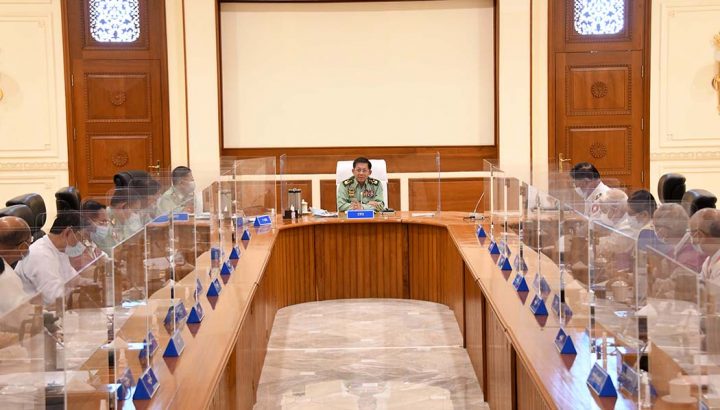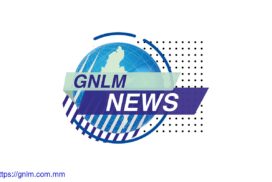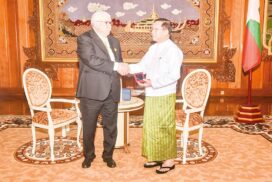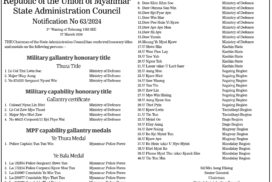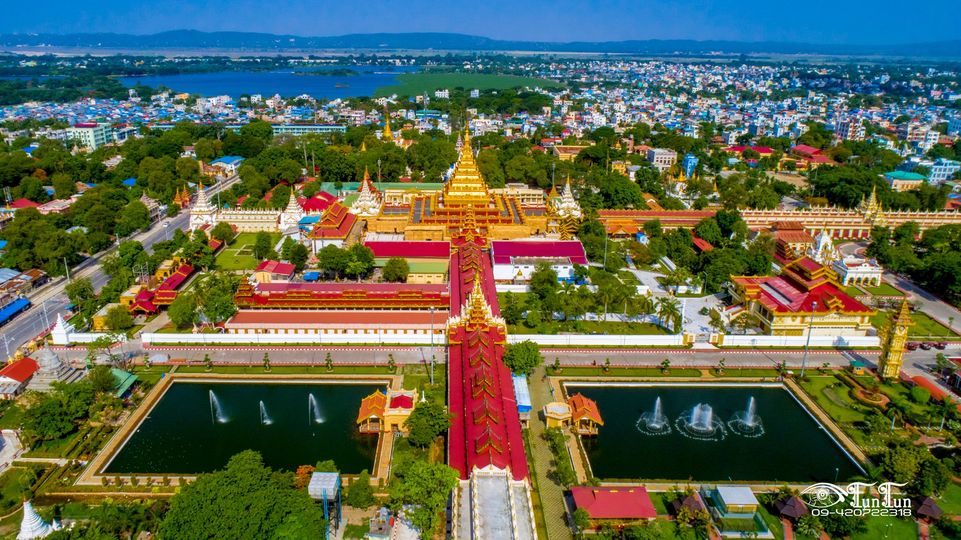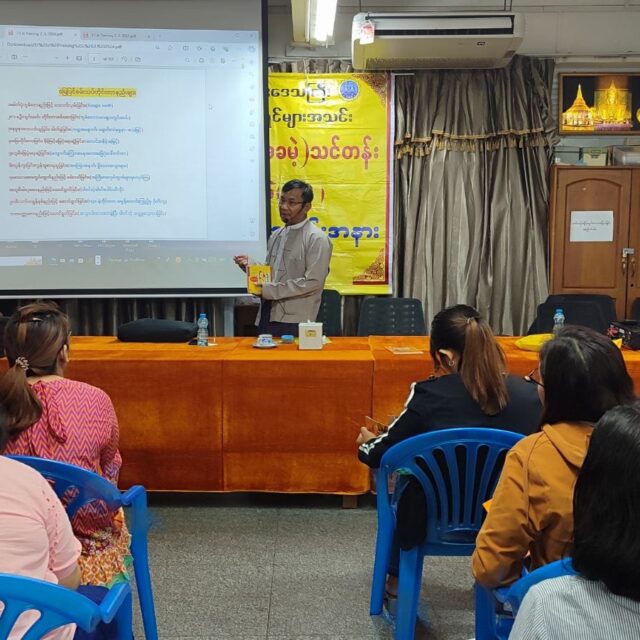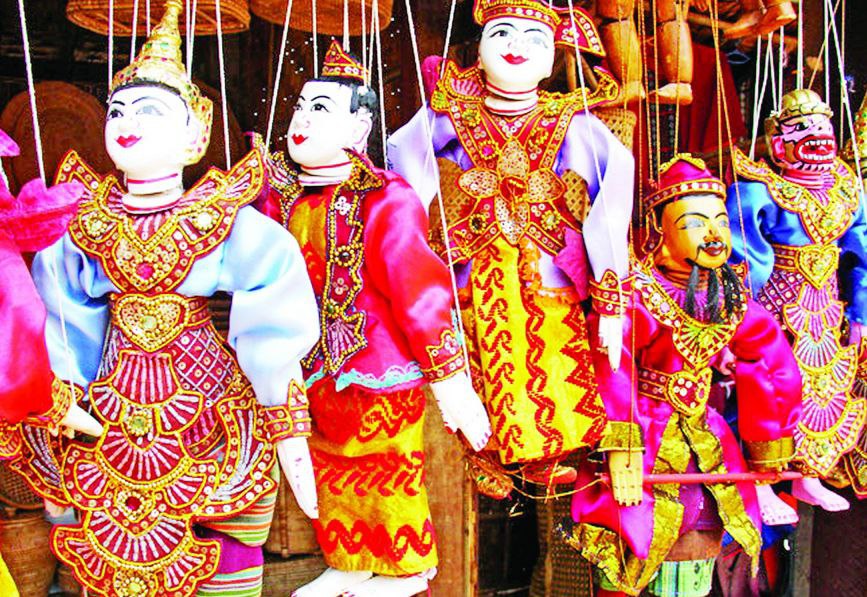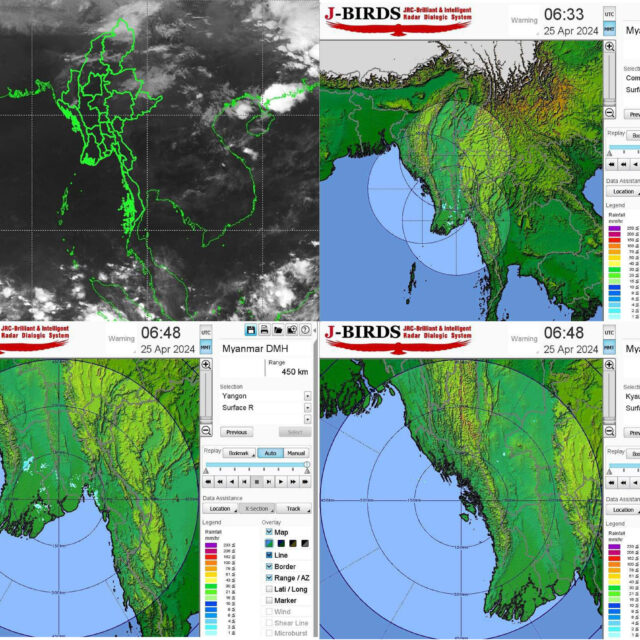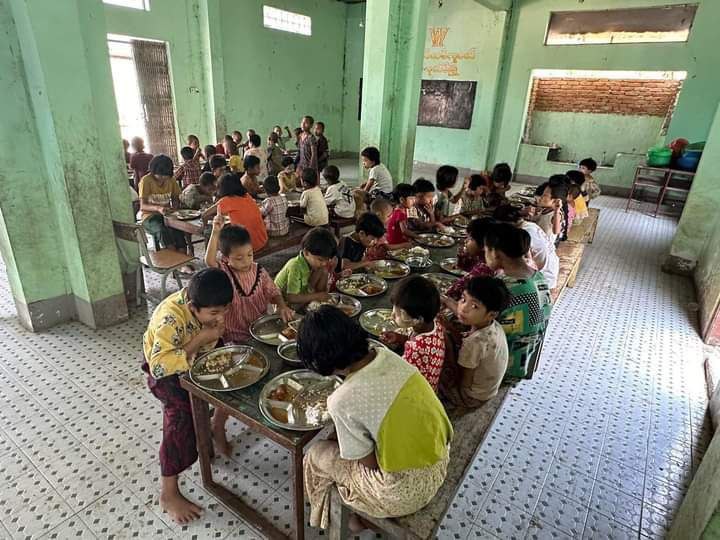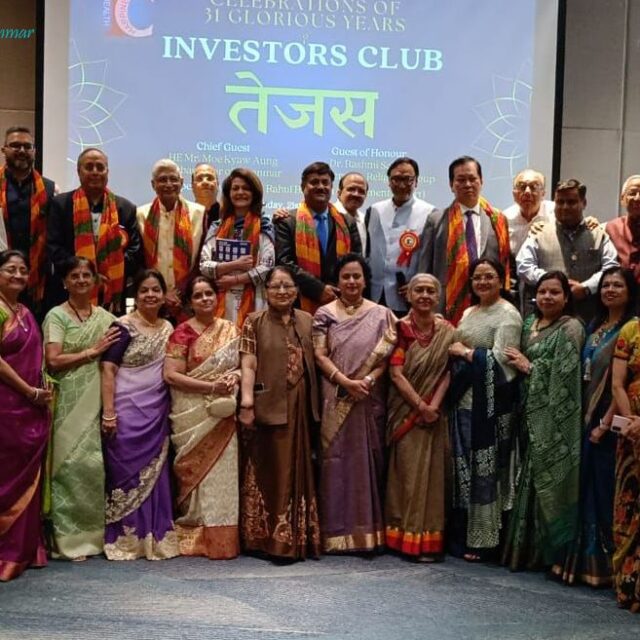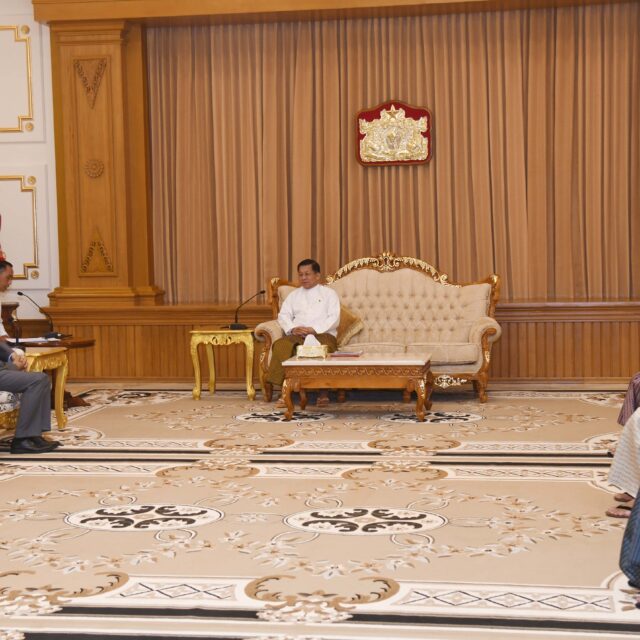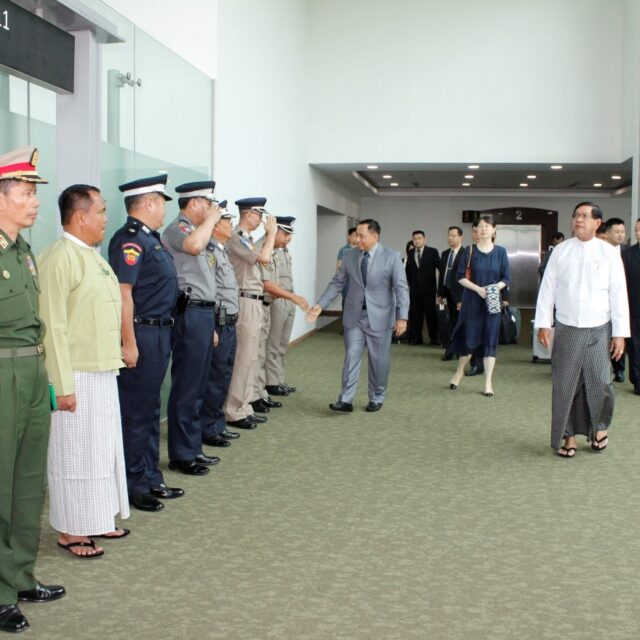Overview
The Government of the State Administration Council has now passed the four-month mark since it was established under a state of emergency in line with the 2008 Constitution of the Republic of the Union of Myanmar. This is the very Constitution through which the previous two governments were elected and the same Constitution that the previous two governments took an oath to uphold.
In the past four months, the State Administration Council has been working hard. Security forces exerted untiring efforts to protect innocent civilians, civil servants, children and schools from arson attacks, bombings and cruel intentional murders by terrorists paid for by the so-called National Unity Government (NUG) formed by the National League for Democracy (NLD) politicians and supporters. This has now been proved without the shadow of a doubt in public confessions made by some of the terrorists of their own free will, clearly not under duress. The evidence makes this clear. Foreign media are invited to contact the State Administration Council’s Information team for further information.
At the same time, all sectors under the leadership of the State Administration Council as well as the Regional Administration Councils have been implementing a multitude of projects and programmes. Throughout, the government health systems have been struggling to cope with the ongoing COVID-19 pandemic as well as other diseases. These public hospitals have been affected by the many doctors who have unethically abandoned their patients to protest against the new government. While Tatmadaw hospitals have stepped in to help meet the needs there is not yet a full complement of staff in public hospitals, although the situation is gradually improving.
Policy directions provided at State Administration Council Meetings
At the sixth meeting of the State Administration Council, held on 6 May, the Chairman of the Council emphasized the need to promote agriculture given that 70 per cent of the country’s population are rural, the importance of the country’s land policy, the need to ensure qualified young people are working in the right place, the need to increase domestic production, and the need for quality civil servants who can perform well.
At the seventh meeting of the State Administration Council on 20 May, the Chairman highlighted the fact the State Administration Council only sets the policy, and that ministries implement it and need to cooperate with one another. He also urged ministry officials to let their own department employees know about the findings of the Union Election Commission and the electoral fraud committed during the 2020 general election.
The meeting also discussed plans to revitalize local industries, such as state-owned garment factories, cotton ginning factories and pharmaceutical factories, plans to reduce foreign currency spending, the inspection of factories leased to the private sector and whether they are keeping to the original contract, natural disasters and water resources management, the public transport system, renewable energy, prevention of electricity wastage and non-revenue electricity losses, and timely collection of electricity tariffs.
The tenth meeting of the SAC held on May 10 discussed the need to ensure transparency and expose voter fraud, the need to watch COVID-19 infections as the COVID-19 infection rate was rising in neighbouring countries, and COVID-19 vaccination programme, which to date had ensured vaccinations for more than 1.9 million people in Myanmar. Despite improvements in the security situation, banks were becoming the targets of economic sabotage and therefore, the government was keeping the political activities affecting the banks under constant surveillance. The Council Chairman also emphasized the importance of small and medium enterprises (SMEs) and cooperatives, especially for the agro-industry sector. SMEs and manufacturing should be promoted in each region and state, and encouraged to sell the products directly through cooperatives. The Chairman condemned the acts of violence aimed at preventing the opening of schools and stopping children from going to classes, adding the imperative to prevent such vicious acts from destroying the country.
The 11th meeting of the State Administration Council, held on 24 May, discussed the unrest and the acts of terrorism, which are being driven by the illegal CRPH, NUG and PDF. Members of these groups had attended explosive training courses provided to them in areas controlled by armed insurgents. The meeting stressed the need for the Myanmar Police Force and administrative bodies to cooperate in ensuring public safety. The meeting also emphasized that the State Administration Council was committed to maintaining peace and stability and to enhancing food security and rural livelihoods. Priority was being given to reduce disparities in wealth between states and regions and promote rural businesses. The meeting also focused on the importance of gaining people’s trust in banks and improving cash flow, complying with laws on the tax system, developing human resources, speeding up the media’s response and ensuring peace and security for children’s education.
The first meeting of the National Natural Disaster Management Committee was held on 27 May. The Chairman of the Committee, Vice-Chairman of the State Administration Council, Vice-Senior General Soe Win addressed the meeting. The Chairman of the Committee emphasized the need for full cooperation between the military and government departments, the involvement of local communities, and timeliness in responding to disasters.
The first meeting of the Central Committee for Statistical Accuracy and Quality Assurance was held on 28 May. The Committee had been established since 2013. The current Chairman of the Committee, Vice-Senior-General Soe Win noted that ongoing projects would need to be accelerated, and that the Committee should step up its activities. Collecting quality data would require full cooperation among all stakeholders.
International and regional relations
The 24th ASEAN Plus 3 Finance Ministers and Central Bank Governors Meeting was held from 3 to 5 May through videoconferencing. Representatives from the Myanmar government were able to present plans to address economic challenges. The meeting was co-chaired by the Deputy Minister of Finance and Economy (Fiscal) of Brunei Darussalam and the Deputy Prime Minister and Minister of Economy and Finance of the Republic of Korea. The meeting was attended by the President of the Asian Development Bank (ADB), the Director of the ASEAN+3 Macroeconomic Research Office (AMRO), the Secretary-General of ASEAN, and the Deputy Managing Director of the International Monetary Fund (IMF).
The government is continuing to implement the return of Bengali displaced persons from Bangladesh to Myanmar, in keeping with the bilateral agreement made between the two countries. On 22 May, those displaced persons who voluntarily decided to return to their homes in Myanmar decided to do so through the auspices of the Union Enterprise for Humanitarian Assistance, Resettlement and Development in Rakhine/ Committee on Humanitarian Assistance, Resettlement and Development. To date, 790 people have returned to Myanmar from Bangladesh and have been issued with national verification cards, which are a first step in obtaining national identification documents.
On 11 May, the Asia-Pacific Joint Group (AP JG) on Money Laundering held a meeting to assess progress. Myanmar representatives discussed the progress in Myanmar’s efforts at Anti-Money Laundering and Countering the Financing of Terrorism (AML/CFT). The meeting discussed the progress on coordinating meetings with regulatory authorities to understand the risks of money laundering, the issuance of risk-based guidelines for Designated Non-Financial businesses and professions, the licensing and supervision of foreign remittance services, the implementation of the Financial Investigation Force, the investigation of money laundering crimes, the confiscation of money and property from criminal activities, and fresh developments in line with UN Security Council resolutions to combat terrorism financing and combat the spread of deadly weapons.
The Governor of the Central Bank of Myanmar attended the 49th meeting of the Asian Clearing Union’s Board of Directors through videoconference on 24 May. The meeting discussed reports on trade activities between member countries, the importance of non-bank financial institutions, and the challenges and solutions.
Meeting the needs of regions and states
The Chairman of the State Administration Council met with members of the Mandalay Region Administration Council and department officials on 17 May and discussed requirements and plans to improve and modernize the city, increase agricultural yield, and enhance education. On the same day, the Chairman of the State Administration Council and party inspected the Artillery Museum, Tomb of King Mindon, Coin Mill and Mya Nan San Kyaw Golden Palace, and also the carriage factory for Myanma Railways in Amarapura Township. They also took a short trip by special train from Myitnge station in Amarapura to Ywa Htaung station in Sagaing.
On 28 May, the Chairman of the State Administration Council inspected the proposed upgrading of the green spaces and park areas around Mingalar Lake in Nay Pyi Taw Union Territory. He noted that Nay Pyi Taw, as the capital city of Myanmar, must be a model of cleanliness.
The Chairman of the State Administration Council met the members of the Kayin State Administration Council and departmental staff on 31 May. He explained the ongoing work of the State Administration Council and its policies. The Union Ministers who accompanied the Chairman on that tour engaged with the relevant Kayin State officials to inspect and guide ongoing projects in the education sector, health and sports sector, and the construction sector.
The role of Tatmadaw
The Chairman addressed the soldiers, officers and trainees from the Advanced Military Training Depot located on the grounds of local battalion in Thabeikkyin on 17 May. He underscored the primary duty of the Tatmadaw, which is to protect the country and he noted that skills and training appropriate to each rank are being provided in various training schools to improve the capacity of every member of the Tatmadaw.
During the meeting with officers, soldiers and their families in the local battalion in Mandalay, Central Command, the Senior General explained the need for Tatmadaw members to be conscientious and dutiful while the Tatmadaw is undertaking the role of caretaker government, in accordance with prevailing laws under the Constitution, with the end goal being a strong, vibrant multiparty democracy desired by the people. He added the need to remain vigilant in the present situation with loyalty to the country and Tatmadaw.
During a meeting with officers, soldiers and their families of local battalion in Hpa-an on 31 May, the Senior General said national defence duty means not only defence and peace building, but also contributing to national efforts to maintain political stability, prevent natural disasters, and implement measures to counter the COVID-19 pandemic.
Investigations by the Union Election Commission
The Union Election Commission conducted field-level investigations of voter lists and ballot papers used in the November 2020. From 1 to 10 May, investigations were conducted in Taze, Kyunhla, Kanbalu and Wetlet townships in Sagaing Region; Mawlamyine, Kyaikmaraw, Mudon, Ye, Chaungzon and Thanbyuzayat townships in Mon State; Tiddim and Falam townships in Chin State; Myothit and Myaing townships in Magway Region; and Dawei, Taninthayi, Kawthoung, Bokpyin, Kyunsu and Launglon townships in Taninthayi Region.
From 11 to 20 May, the Union Election Commission conducted investigations in Taunggyi, Nyaungshwe, Kalaw, Ywangan, Pinlaung, Kunlong and Tangyan townships in Shan State; Pakkoku, Minbu, Pwintbyu, Ngaphe, Sedoktara, Salin and Mindon townships in Magway Region; and Myanaung, Kyangin, Maubin, Pantanaw, Nyaungdon, Kyaiklat, Dedaye, Myaungmya, Einme, Wakema, Labutta, Mawlamyinegyun, Pathein, Kangyidaunt, Ngapudaw, Thabaung, Kyaunggon, Yekyi, Kyonpyaw, Pyapon, Bogale, Hinthada, Danubyu, Laymyethna, Ingapu and Zalun townships in Ayeyawady Region.
From 21 and 31 May, the Union Election Commission carried out investigations in Shwebo, KhinU, Dabayin, Tamu, Kawlin, Kalewa and Minkin townships in Sagaing Region; Kongyan, Kehsi, Hsipaw, Pindaya, Pekhon, Mongsat, Mongyan, Mongnai, Hsenwi, Kyaukme, Nawnghkio, Mongmit, Mabein, Metmung, Mongton, Muse, Kutkai, Mongkhat, Kengtung, Mongyai, Hsihseng, Namhsam, Mongpyin, Hopong, Loilem, Yaksawk, Tachilek and Mongphyat townships in Shan State; Haka, Falam, Mindat, Matupi and Paletwa townships in Chin State; Kalay, Htigyaing, Wuntho, Bamauk, Pinlebu, Katha, Indaw, Hkamti, Homalin, Leshi, Lahe, Nanyun, Mawlaik and Phyaungpyin townships in Sagaing Region; Myeik, Pulaw, Thayetchaung and Yebyu townships in Taninthayi Region; and Lashio, Langkho, Laikha, Hopang, Namhkam, Laukkai and Mongyawng townships in Shan State.
The Union Election Commission have disseminated and made public their findings to date on the voting conditions and the violations of Election laws, rules, and regulations during the 2020 November elections in 45 townships in Yangon Region on 13 May; 10 townships in Mon State on 14 May; eight townships in Rakhine State on 14 May; seven townships in Kayah State on 16 May; and 25 townships in Magway Region on 24 May.
Socio-economic activities
The Chairman of the State Administration Council sent a message to the event held to commemorate Worker’s Day on 1 May. He called for cooperation among the government, employers and employees for the long-term development of the country. He emphasized adherence to rules and regulations, the need to work hard for the country’s development, and the need to make joint efforts for the country’s economy to recover and lead to socio-economic progress for all citizens.
The Moe Kaung Treasure Maternal and Child Hospital and Myawady Media Centre in Yankin Township, Yangon were inaugurated by the Chairman of the State Administration Council on 2 May. The hospital had been built to meet the needs of the people for quality health care services. By providing health care meeting international standards of quality. The hospital fills a gap for local people who cannot afford to travel overseas for health care.
At the opening ceremony of the Myawady Media Centre, the Chairman observed that the media, the fourth pillar of democracy, is a force that can greatly contribute to national culture and national interests, play a key role in promoting freedom of expression, democracy, and transparency, and in educating the public. The new Myawady Media Centre will make it possible to use or rent high-tech filming and recording studios in one place, and artists and media people from all walks of life will be able to come together. The Media Centre will aim to improve the standard of broadcasts to international levels.
The Ministry of Social Welfare, Relief and Resettlement provided cash assistance to charity organizations, persons with disabilities and senior citizens in respective states and regions. In addition, a coordination meeting was held on 19 May on the development of draft guidelines for the screening of convicted children in training schools. The guidelines will ensure that the best interests of the child are taken into account when dealing with such cases.
At the Myanmar Fire Brigade Day celebrations on 5 May, the Chairman of the State Administration Council presented a cash prize of Kyats 10 million and essential food items as tokens of appreciation for firemen and their families.
Under the guidance of the State Administration Council, various states and regions continued implementing the “Pan Khin” project, which aims to issue national identification cards to every Myanmar citizen and update their household data.
On 12 May, a meeting was held on the issue of Memorandum of Understanding (MoU) between Myanmar and Thailand, in order to protect children affected by migration. Standard operational procedures will be further drafted to systematically speed up cooperation between the two countries after the signing of the MoU. Myawady, Mae Sot, Kawthaung and Ranong have already been selected as sites for pilot projects.
to be continued.

